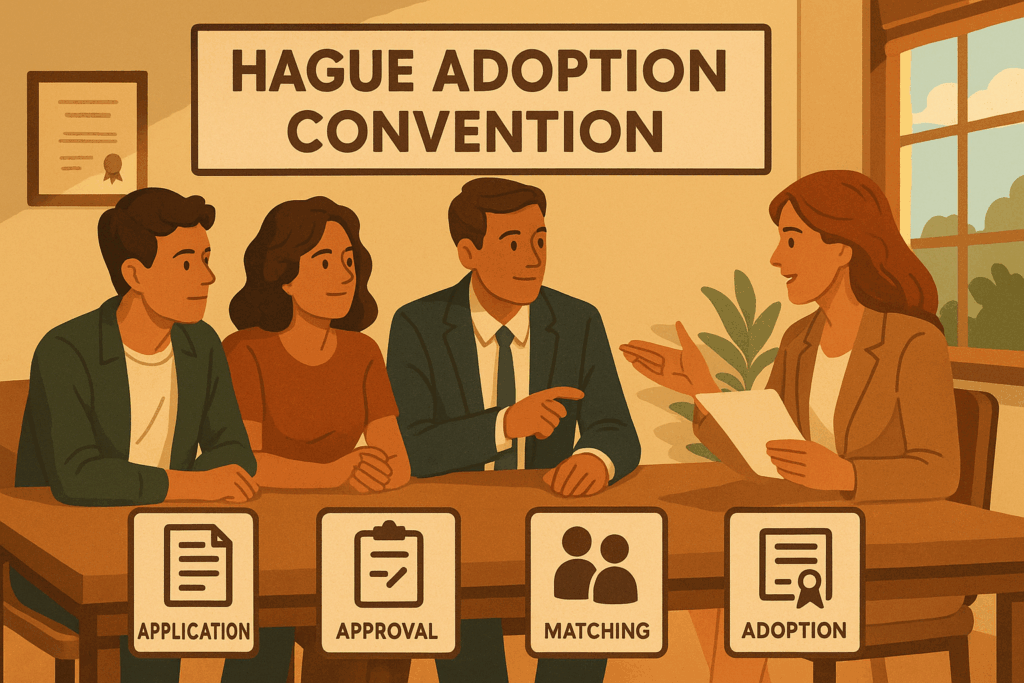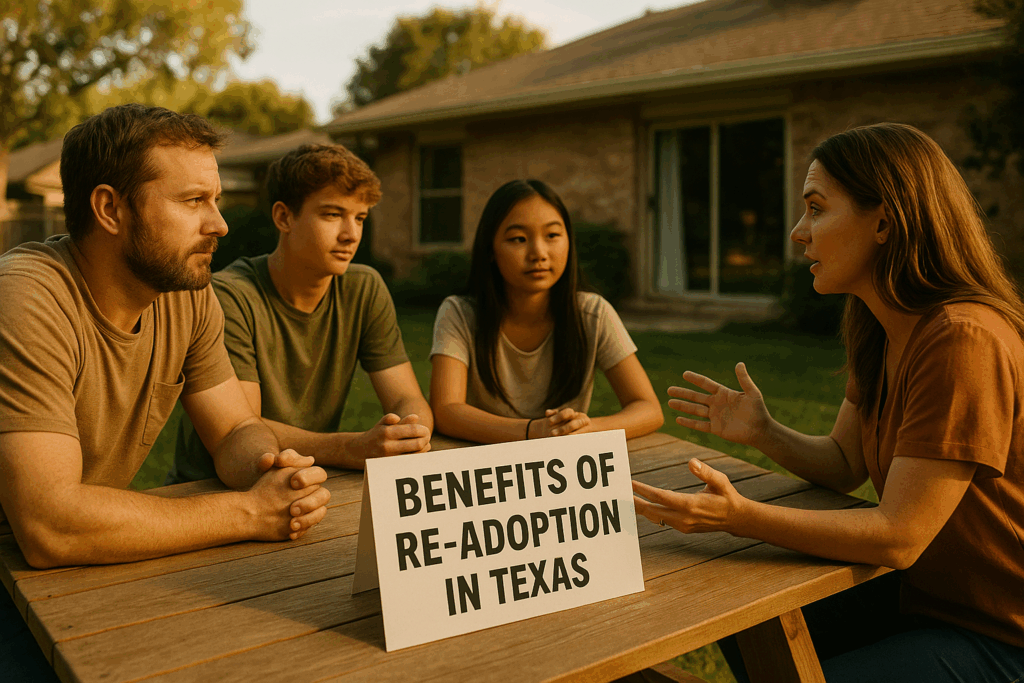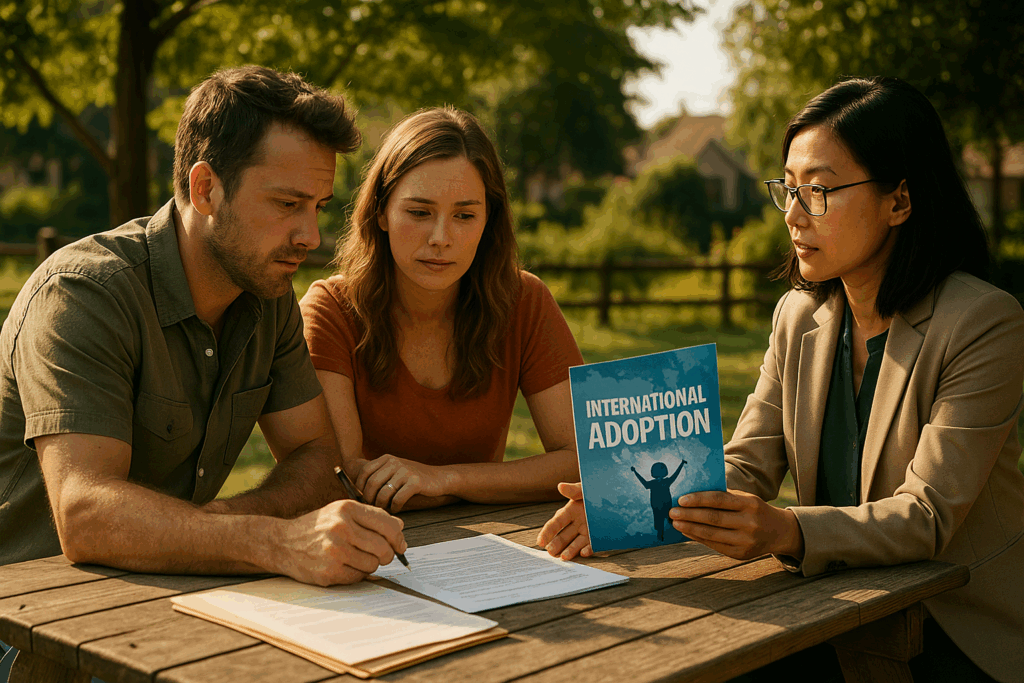
For residents of Tomball, Texas, undEver wondered what it really takes to welcome a child from another country into your Tomball home? Maybe you’ve pictured bedtime stories in two languages or family dinners blending Tex-Mex with your child’s native cuisine. If that sounds like a dream worth pursuing, you’re probably also wondering how to make it happen legally. Here’s the deal: understanding International Adoption Laws For Tomball Texas is the first—and most important—step in turning that dream into a reality.
Short answer? Yes, international adoption is absolutely possible for Tomball families—but it involves a highly detailed process filled with legal, emotional, and cultural considerations. Whether you’re navigating the difference between Hague and non-Hague countries, securing U.S. citizenship for your child, or figuring out how Texas courts view foreign adoptions, there’s a lot to unpack—and you don’t want to go it alone.
In this guide, we’re covering everything you need to know about adopting internationally from right here in Tomball. You’ll get expert legal insights, real-world examples, and practical tips from the team at The Law Office of Bryan Fagan, PLLC, where our mission is simple: educating families and protecting futures. Stick with us if you want your adoption process to be not only legally sound but emotionally rewarding—and filled with fewer surprises along the way.
Key Takeaways
- Understanding international adoption laws is crucial for prospective adoptive parents in Tomball, Texas, as it facilitates compliance with both U.S. and international regulations while addressing cultural complexities.
- The international adoption process involves key legal steps such as choosing a country, completing a home study, filing with USCIS, and finalizing the adoption in the child’s home country, with various immigration pathways available depending on the context.
- Re-adoption in Texas is recommended for internationally adopted children, as it ensures legal recognition, secures citizenship rights, and provides essential identity documentation like U.S. birth certificates and Social Security cards.
Importance of Understanding International Adoption Laws
Understanding International Adoption Laws For Tomball Texas is essential for families looking to welcome a child from another country into their home. These laws are designed to align international adoption procedures with both U.S. and Texas family law requirements. Under Texas Family Code §162.023, Texas courts may recognize a foreign adoption decree, but families are often encouraged to re-adopt in Texas to ensure full legal protection and to obtain a Texas birth certificate for the child. This process reinforces parental rights and streamlines documentation for education, healthcare, and inheritance purposes.
International adoption also involves navigating U.S. immigration laws, the Hague Adoption Convention (when applicable), and the unique legal requirements of the child’s country of origin. Failing to follow proper procedures can delay or even derail the adoption. At our firm, we often advise families in Tomball to work closely with Hague-accredited agencies and experienced adoption attorneys to ensure compliance at every stage of the process. This helps protect both the child’s legal status and the adoptive parents’ rights.
Beyond legal requirements, international adoption presents meaningful cultural considerations. Adopting a child from a different background involves more than paperwork—it’s a lifelong commitment to supporting that child’s identity, heritage, and emotional well-being. Families should prepare to embrace the child’s culture and anticipate the challenges and rewards of raising a multicultural family, something our team regularly helps families navigate with sensitivity and support.
Prospective adoptive parents should also prepare financially. International adoptions often involve agency fees, travel, legal expenses, and post-placement requirements. To get a clear understanding of costs, we recommend reviewing this guide on the average cost of adoption in Texas. For more insight into adoption readiness, visit our post on Texas adoption qualifications. Our firm is committed to helping families in Tomball navigate every step of the adoption journey with confidence and compassion.

Key Legal Steps in International Adoption
The international adoption process in Texas includes several key legal steps. The journey begins with choosing a country from which to adopt and selecting a licensed adoption agency. The agency guides you through necessary procedures, ensuring compliance with both U.S. and international laws.
Completing a home study is one of the initial steps, assessing the adoptive family’s readiness and home environment. Adoptive parents must then file forms with U.S. Citizenship and Immigration Services (USCIS) to confirm their eligibility and that of the child for adoption, including submitting documents and undergoing background checks.
Traveling to the child’s home country is another crucial step, often requiring an extended period of one to four weeks. During this time, the adoption is finalized, and adoptive parents must adhere to the legal requirements of the child’s country of origin. Adoption eligibility confirmation is valid for up to 15 months for Hague countries and up to 18 months for non-Hague countries.
U.S. Federal Immigration Laws and International Adoptions
U.S. federal immigration laws are crucial in international adoptions, offering three pathways for bringing children from abroad. One pathway is the Immediate Relative Petition, which adoptive parents can file to facilitate their child’s immigration. Once approved, this petition grants the child immediate relative status, streamlining the process to adopt a child.
Another significant pathway is the Hague legal process, applicable to adoptions involving children from countries that are parties to the Hague Intercountry Adoption Convention. This process ensures adoptions are conducted ethically and in the best interests of the child, which many are interested in.
For countries not part of the Hague Convention, the Orphan Process is utilized, with its own set of requirements for the child’s country immigration.
An experienced adoption attorney helps navigate these complex processes, ensuring all legal requirements and documentation are handled correctly. Completing the re-adoption process in the U.S. secures the child’s citizenship status, providing them with the same rights as a biological child. Stepparent adoption can also be a part of this journey.
Role of the Hague Adoption Convention
Understanding the International Adoption Laws For Tomball Texas is vital for families considering welcoming a child into their home from another country. One of the most important legal frameworks in this area is the Hague Adoption Convention, which ensures that international adoptions are conducted in the best interest of the child, with transparency and safeguards in place. Under Texas Family Code §162.023, Texas courts can recognize a foreign adoption order, provided it complies with both U.S. and Texas legal standards. However, families are often encouraged to complete a re-adoption in Texas to ensure full recognition of parental rights and to secure a Texas-issued birth certificate.
Hague Convention countries are required to follow uniform legal procedures, including oversight by a designated Central Authority to ensure ethical and lawful placements. All adoption agencies involved must be Hague-accredited, which helps protect the integrity of the process and the safety of the child. This accreditation ensures that both the child’s and the adoptive parents’ rights are upheld and that all legal requirements are met across both countries.
As our family law team often advises, working with an adoption agency that is accredited in both the United States and the child’s country of origin is crucial to ensuring compliance with international and Texas laws. For Tomball families, this approach not only protects against delays or denials but also ensures that the adoption is recognized across borders and within Texas courts, safeguarding the child’s legal status and the adoptive parents’ rights.
To learn more about how these international adoption procedures apply locally, visit our dedicated page on the Upper Kirby adoption services area. For more detailed guidance on completing your family’s journey, we also recommend reading our blog on why re-adoption may be necessary after an international adoption. The Law Office of Bryan Fagan, PLLC is here to support you with trusted legal guidance and compassionate care as you navigate each step of the international adoption process.

Texas-Specific Requirements for Adoptive Parents
When pursuing international adoption, families in Tomball must comply with both federal and state requirements to ensure a safe, stable environment for the child. Under Texas Family Code §162.003, prospective adoptive parents must undergo a thorough home study that evaluates their readiness and suitability to adopt. This process includes criminal background checks, reviews of abuse and neglect history, and home visits to confirm a secure living space for the child. These safeguards are especially important under the broader framework of International Adoption Laws For Tomball Texas, which ensure ethical compliance across borders.
In addition to safety assessments, the home study involves a comprehensive review of the adoptive parents’ health records and personal statements explaining their motivation to adopt. Once the child is placed, post-placement visits allow social workers to monitor how the child is adjusting and evaluate the overall family dynamic. These visits are essential to confirming that the adoptive home continues to meet Texas’s standards for stability and care, especially when the child is coming from another country with different legal and cultural backgrounds.
Adoptive parents must also demonstrate that they are physically, mentally, and emotionally prepared to raise a child with empathy and respect. A strong understanding of the loss, trauma, and identity issues that international adoptees may face is crucial. According to the attorneys at our firm, Texas law prioritizes the child’s best interests by requiring parents to show they can meet not just logistical needs but emotional and psychological ones as well—reinforcing protections outlined in both state and international adoption regulations.
For a deeper look at the legal steps involved in adopting internationally from Tomball, visit our comprehensive guide on international adoption services in Texas. We also invite you to explore our blog post on the importance of re-adoption for international families, which outlines how to further protect your parental rights once the child is in Texas. At The Law Office of Bryan Fagan, we’re here to walk you through every step of the process with trusted legal support and genuine care for your family’s future.

Finalizing or Re-Adopting a Child in Texas
Re-adoption in Texas is highly recommended to ensure the adoption is legally recognized and secures the child’s rights as a U.S. citizen. This process validates foreign adoption documents under U.S. law, minimizing potential documentation issues. It includes filing for the child’s U.S. visa and registering the foreign adoption order in Texas.
After the foreign adoption order is registered, it is enforceable in Texas, granting full faith parental rights to the adoptive parents. The court examines the foreign adoption order to confirm it complies with state laws and public policies. Foreign adoption orders carry the same legal weight as domestic ones, ensuring the child has the same rights as a biological child.
Final hearing for re-adoption in Texas often involve celebrations, making the event memorable for the adoptive family. After finalization, parents can obtain an amended birth certificate and a Social Security card for their child, solidifying their legal status in the United States.
Obtaining a Texas Birth Certificate
Obtaining a Texas birth certificate following an international adoption is crucial for establishing the child’s identity. To apply for a new birth certificate, adoptive parents must submit a completed Certificate of Adoption form along with a certified final Decree of Adoption. This process ensures the child’s birth and adoptive details are accurately recorded, providing a crucial identification document.
Trained examiners review applications for adoption birth certificates, and any errors can lead to rejection, requiring resubmission. Only birth certificates for children born in Texas can be processed, even if the adoption occurs in another state, including cases involving a child’s birth.
Guidance from an attorney or the district clerk can help ensure the application is completed correctly.
Benefits of Re-Adoption in Texas
For families navigating International Adoption Laws For Tomball Texas, re-adoption in the State of Texas offers a valuable legal safeguard—even if the adoption was already finalized in the child’s country of origin. According to Texas Family Code §162.023, Texas courts may recognize a foreign adoption decree, but re-adoption is often recommended to solidify the legal parent-child relationship under U.S. and Texas law. This step ensures that parental rights are protected nationwide and reduces the possibility of future legal disputes concerning custody, inheritance, or recognition of the adoption.
One of the key benefits of re-adoption is the ability to obtain a Texas-issued birth certificate, which simplifies access to essential identification documents like a Social Security card, passport, or school enrollment records. These documents are critical to confirming the child’s legal identity in the United States and make day-to-day life more manageable for the family. Re-adoption also eliminates reliance on foreign court orders by affirming the adoption’s validity within the U.S. legal system, providing long-term peace of mind.
Legal professionals and adoption agencies consistently recommend re-adoption to ensure the adopted child enjoys the same protections as a biological child under Texas and federal law. This process is particularly important when securing the child’s U.S. citizenship and future legal benefits. As our family law team often advises, formalizing the adoption in Texas helps families move forward with confidence and clarity.
To better understand the full process, explore our comprehensive overview of international adoption steps in Texas. You can also read our related blog post on the legal value of re-adopting internationally adopted children. At The Law Office of Bryan Fagan, we are committed to supporting families through every phase of the adoption journey—with both legal precision and compassionate care.

Practical Tips for Navigating International Adoption
Navigating the international adoption process can be complex, especially for families in Tomball. To stay in compliance with International Adoption Laws For Tomball Texas, it’s essential to understand both the legal and procedural aspects of adoption. One of the first steps is working with a Hague-accredited adoption agency, as these agencies are certified to handle adoptions in compliance with international standards. They are well-versed in the intricacies of both Hague and non-Hague processes and play a vital role in ensuring each step—from paperwork to placement—is handled properly and lawfully.
Texas recognizes foreign adoption orders under Texas Family Code §162.023, but recognition isn’t automatic. Documentation must be properly submitted, and court approval is typically required to finalize legal recognition in the state. That’s why assembling all required documents—from the foreign adoption decree to certified translations and immigration paperwork—is key. Legal guidance from a Texas family law attorney can make all the difference in ensuring the adoption is legally valid and enforceable, both in Texas and throughout the United States.
It’s also important for families to understand the two primary types of international adoptions: Hague and non-Hague. Hague adoptions involve countries that are part of the Hague Adoption Convention and follow a highly regulated, uniform process. Non-Hague adoptions, while still legal, may have different requirements and additional steps for verification. As our attorneys often advise, knowing which path you’re taking—and what each requires—can help avoid delays, reduce stress, and ensure a smoother transition for your family.
For a detailed breakdown of how to properly validate your adoption in Texas, we recommend reading our guide on streamlining the process of recognizing a foreign adoption order in Texas. You can also learn more about related post-adoption steps in our blog on the importance of re-adoption for international families. The Law Office of Bryan Fagan, PLLC is here to help you navigate every legal detail with care, clarity, and confidence as you welcome a child into your home.

Real-Life Examples and Client Success Stories
Real-life adoption journeys often illustrate just how impactful and meaningful the process can be for families. One of our Tomball clients successfully completed an open adoption that began with an honest and respectful relationship with the birth father. Through clear communication, mutual understanding, and legal guidance, the adoption resulted in a stable and emotionally fulfilling placement for everyone involved. Stories like this reveal the powerful connections that can grow from compassion, transparency, and thoughtful planning.
Sharing client success stories helps prospective adoptive parents see beyond the legal steps and into the emotional richness of adoption. While every journey is unique, the emotional bonds and lasting relationships that develop—especially in open adoption scenarios—highlight the life-changing nature of the experience. These examples provide encouragement, helping families understand that, with the right guidance and preparation, adoption can be both legally sound and personally transformative.
Under Texas Family Code §162.002, adoptive parents are granted the same legal rights and responsibilities as biological parents once an adoption is finalized. For Tomball families navigating international adoption, understanding these protections—along with the broader International Adoption Laws For Tomball Texas—is essential. The legal process, while rigorous, exists to secure the well-being of the child and ensure lasting security for the adoptive family.
For more insight on how our team supports families across the region, visit our page on adoption services in Tomball. You can also explore our blog post on the importance of establishing post-adoption support to learn how our firm continues to guide clients even after finalization. At The Law Office of Bryan Fagan, we are honored to stand beside families throughout the adoption journey—from first steps to lifelong fulfillment.
How Bryan Fagan PLLC Can Assist
The Law Office of Bryan Fagan PLLC specializes in helping families understand and comply with international adoption laws for Tomball, Texas. Legal counsel from Bryan Fagan PLLC provides clarity on the entire adoption process, from filing paperwork to court representation, ensuring all legal requirements are met.
Clients receive personal and close attention throughout the international adoption process, with tailored legal guidance to meet their specific needs. By providing thorough support and understanding, Bryan Fagan PLLC ensures families successfully navigate the complex landscape of international adoption laws.
Conclusion:
Adopting a child from another country isn’t just a legal process—it’s a life-changing journey filled with hope, courage, and a whole lot of paperwork. But for families in Tomball, Texas, navigating International Adoption Laws For Tomball Texas doesn’t have to be overwhelming when you have the right guidance and support behind you. Whether you’re just starting to explore your options or you’re knee-deep in home studies and visa forms, knowing what to expect—and who to trust—can make all the difference.
At The Law Office of Bryan Fagan, PLLC, we’re here to walk with you every step of the way. Our team understands the legal ins and outs of international adoption, but more importantly, we understand the heart behind it. You’re not just building a case—you’re building a family, and that deserves every ounce of care, clarity, and compassion.
So if this blog has sparked new questions or helped you feel more confident about the road ahead, don’t stop here. Let’s talk. Schedule a consultation and let us help you turn international adoption into a successful chapter in your family’s story. And remember—every incredible journey starts with a single step… and maybe a really good checklist.
International Adoption FAQs
Does the US allow international adoption?
Yes, the United States permits international adoption, allowing U.S. citizens to adopt children from other countries under specific legal guidelines. The process must comply with U.S. immigration laws and the laws of the child’s home country.
What are the rules for adoption in Texas?
Texas requires adoptive parents to complete a home study, background checks, and meet certain age and residency requirements. Consent from the child and birth parents may also be necessary depending on the child’s age and situation.
How much does it cost to adopt internationally in the US?
International adoption typically costs between $20,000 and $50,000, depending on the country, agency fees, travel expenses, and legal services.
What are the standards for international adoption?
Standards for international adoption vary by country, but generally include thorough vetting of adoptive parents, documentation of eligibility, compliance with either Hague or non-Hague processes, and ensuring the adoption serves the child’s best interests.
How long does an international adoption process take?
The process usually takes between 12 to 36 months, depending on the country, agency, and completion of required legal steps like the home study, immigration filings, and court approvals.
What country is easiest to adopt from?
Some of the countries with more streamlined adoption processes include Colombia, South Korea, and the Philippines, although ‘easiest’ can depend on a family’s specific circumstances and eligibility criteria.
What is the 3 3 3 rule for adoption?
The 3-3-3 rule is a general parenting guideline for transitions: expect it to take 3 days to adjust to immediate changes, 3 weeks to develop a routine, and 3 months to feel a new normal. It’s especially relevant for adopted children adjusting to a new environment.
How much does it cost to legally adopt in Texas?
The cost of adoption in Texas can range from $300 for a foster adoption to $40,000 or more for a private or international adoption. Legal and agency fees are the biggest contributors to overall costs.
What will disqualify you from adopting a child in Texas?
Disqualifying factors may include a history of child abuse, certain criminal convictions, or an unstable home environment. Each case is reviewed individually to determine the child’s best interests.
Bryan Fagan is a Texas family law attorney with a heart for adoption—inspired not just by his legal career, but by his own family story. Growing up in Atascocita with two adopted brothers, Bryan learned early the profound meaning of chosen family. His passion for justice was sparked by John Grisham’s The Pelican Brief, and he became the first lawyer in his family, balancing night classes at South Texas College of Law while caring for his grandmother with Alzheimer’s.
Today, Bryan brings that same dedication to his practice, guiding families through adoptions, custody disputes, divorces, and complex marital agreements. A certified member of the College of the State Bar of Texas, he combines elite legal expertise with genuine empathy—drawing from his roles as a husband, father of three, and advocate for families facing false CPS allegations.
Based in Houston, Bryan is actively involved in the Houston Bar Association’s Family Law Sector and statewide family law organizations. Whether finalizing an adoption or protecting parental rights, he believes the law should reflect the deepest values of home, commitment, and love.

